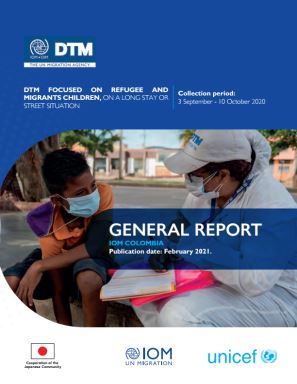-
Countries
-
Data and Analysis
-
Special Focus
-
Crisis Responses
Colombia - DTM Focused on Refugee and Migrants children, on a Long Stay or Street Situation (3 September - 10 October)

Contacto
DTMColombia@iom.int
Idioma
English
Ubicación
Colombia
Fecha de instantánea
Sep 03 2020
Oct 10 2020
Actividad
- Survey
- Mobility Tracking
The complex political and socioeconomic panorama of the Bolivarian Republic of Venezuela has generated one of the largest migratory movements in recent years; an estimated 5.4 million people have left that country, and of these, more than 4.6 million remain in Latin American and Caribbean countries.
Colombia has not been foreign to this situation. According to the data presented by Migración Colombia as of October 2020, there are 1.7 million Venezuelan nationals present in Colombia, of these 12% are Children (NNA)2, who as actors in this migratory phenomenon pose a great challenge for the Government of Colombia (CG) at the national and local levels, which, in an attempt to guarantee the human rights and fundamental freedoms of this population, must implement and strengthen programs to a response oriented to the needs of migrant children and adolescents.
In order to implement public policies, programs and successful projects specifically intended for refugee and migrant children and adolescents undergoing long stay or street situation and their families, it is necessary to determine their current location, needs, vulnerabilities, migratory flows and conditions. In this regard, the International Organization for Migration (IOM), in furtherance of its mission, implemented the Displacement Tracking Matrix focused on refugee and migrant children and adolescents undergoing long stay or street situation (hereinafter DTM NNA for its Spanish acronym), in six departments of the national territory (Atlántico, Cesar, La Guajira, Nariño, Norte de Santander and Valle del Cauca). For such purpose, support was provided by the United Nations High Commissioner for Refugees (UNHCR), the United Nations Development Fund (UNICEF), and the Colombian Institute of Family Welfare (ICBF) in the conceptual coordination and consolidation of social offer in the territories.
This report is made up of six sections, with inputs to generate public policy recommendations that can be considered in the work plans of territorial and national entities, to strengthen the complementary actions between the Government of Colombia and International Cooperation.
